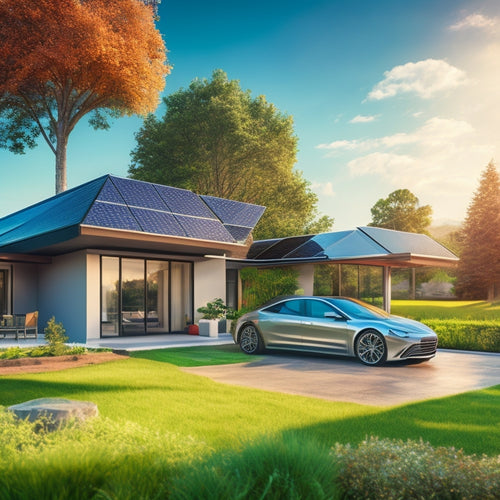
Is the Cost Benefit of Solar Panels Worth It
Share
As you weigh the cost-benefit of solar panels, consider that upfront costs are influenced by system size and energy consumption, but energy payback periods and tax credits can greatly lower expenses. You can save $400 to $1,000 annually on electricity bills, and with market trends indicating decreasing solar costs, your investment can break even sooner. Additionally, solar panels increase your property value, create job opportunities, and provide a clean, renewable energy source. By understanding the complex interplay of these factors, you'll be able to make a more informed decision – and uncover the full extent of solar panels' financial and environmental benefits.
Key Takeaways
- Solar panels can save households $400 to $1,000 annually on electricity bills, depending on energy usage patterns and solar efficiency.
- The cost-benefit analysis of solar panels is influenced by upfront costs, energy payback period, tax credits, and financing options.
- Homes with solar panels sell for up to 17% more than those without, increasing property appeal to environmentally conscious buyers.
- High-quality solar panels can last 25-30 years, with performance degradation ranging from 0.2-1.0% per year, and warranties varying from 25 to 40 years.
- Solar energy provides a clean, renewable energy source, reducing carbon footprint and contributing to climate change mitigation, making it a worthwhile investment.
Understanding Solar Panel Costs
With the rising demand for renewable energy, understanding the costs associated with solar panels is vital for homeowners and businesses alike. You need to take into account solar financing options, which can greatly impact your upfront costs.
Installation costs vary depending on system sizing, which is influenced by your energy consumption patterns and available roof space. It's important to evaluate the energy payback period, which is the time it takes for the system to generate enough energy to offset its installation cost.
You should also factor in tax implications, such as the 30% federal tax credit, and local incentives that can reduce your expenses. Market trends and technology advancements are driving down costs, making solar energy more competitive with fossil fuels.
Warranty coverage and grid connection fees are additional expenses to take into account. When evaluating solar panel costs, it's vital to analyze these factors to determine the viability of solar energy for your specific situation.
Benefits of Renewable Energy
Sustainability, a cornerstone of modern living, is deeply intertwined with the benefits of renewable energy. As you consider investing in solar panels, it's crucial to comprehend the broader advantages of renewable energy.
-
Energy independence: Renewable energy reduces reliance on fossil fuels, decreasing the impact of price volatility and enhancing energy security.
-
Job creation: The renewable energy industry is creating new job opportunities in manufacturing, installation, and maintenance, stimulating local economies.
-
Technological innovation: The growth of renewable energy drives innovation, leading to improved efficiencies and reduced costs.
-
Grid resilience: Integrating renewable energy sources into the grid increases its resilience and ability to withstand disruptions.
-
Energy diversification: Renewable energy reduces dependence on a single energy source, promoting a more sustainable and diversified energy mix.
Savings on Electricity Bills
As you investigate the benefits of renewable energy, one of the most tangible advantages of investing in solar panels is the significant reduction in your electricity bills. By utilizing solar energy, you can reduce your electricity consumption from the grid, leading to substantial savings.
The amount you'll save depends on your energy usage patterns, solar energy efficiency, and the number of peak sunlight hours your location receives. With a grid connection, you can sell excess energy back to the utility company, further offsetting your energy costs.
Effective household energy management is key to maximizing your savings. Understanding your utility rate structures and optimizing your energy consumption during off-peak hours can help you get the most out of your solar panel investment.
With financing options available, the cost of solar panels can be spread over time, making the shift to renewable energy more accessible. By crunching the numbers, you'll find that the savings on electricity bills can be substantial, making solar panels a worthwhile investment for your wallet and the environment.
Environmental Impact of Solar
Beyond the financial benefits, solar panels have a significant impact on the environment. By utilizing the power of the sun, you're reducing your reliance on fossil fuels, which in turn decreases carbon emissions and contributes to climate change mitigation.
-
Solar technology offers a clean and renewable source of energy, which supports sustainable development and resource conservation.
-
By going solar, you're promoting energy independence, reducing your carbon footprint, and improving air quality in your community.
-
The ecosystem benefits of solar panels are substantial, as they reduce pollution and preserve natural resources for future generations.
-
Solar panels also help reduce greenhouse gas emissions, a critical step in combating climate change.
-
As you shift to solar power, you're contributing to a cleaner, healthier environment for yourself and those around you.
Government Incentives and Rebates
You've already taken a considerable step towards reducing your carbon footprint by choosing solar power.
Now, let's explore the financial benefits you can access. The government offers various incentives to encourage the adoption of solar energy. You can claim federal tax credits, which can cover up to 26% of your total solar panel installation cost.
In addition, many states offer rebates that can further reduce your upfront expenses. Local incentives, such as property tax exemptions or sales tax waivers, can also sweeten the deal.
Financing options, like solar grants and utility programs, can provide low-interest loans or cash incentives to help you get started. Some utilities even offer performance-based incentives, where you're rewarded for generating excess energy.
Moreover, installation subsidies can help offset the cost of equipment and labor.
Increased Property Value
Installing solar panels can greatly enhance your property's value, with studies showing that homes equipped with solar panels sell for up to 17% more than similar homes without them. This increase in value is driven by solar market trends, which indicate a growing demand for sustainable energy solutions.
As a homeowner, you can capitalize on this trend by investing in solar panels, thereby increasing your property's appeal to environmentally conscious buyers.
Some key benefits of increased property value due to solar panels include:
- Real estate appreciation: Solar panels can elevate your property's value, making it more attractive to potential buyers.
- Investment returns: By installing solar panels, you can recoup your investment through increased property value and potential tax benefits.
- Neighborhood interactions: Solar panels can make your property stand out in a competitive market, attracting buyers who value sustainability.
- Property tax implications: In some areas, solar panels may increase your property taxes, but this can be offset by the increased value of your property.
- Buyer incentives: Solar panels can be a major selling point for eco-friendly buyers, who may be willing to pay a premium for a sustainable home.
Solar Panel Maintenance Costs
You'll need to take into account the daily cleaning needs of your solar panels to guarantee optimal energy generation, as well as the frequency of panel inspections to identify potential issues before they become major problems.
Additionally, you should factor in the costs of repairing or replacing damaged panels, which can range from $100 to $500 per panel depending on the extent of the damage.
Daily Cleaning Needs
Solar panel arrays, like any other outdoor equipment, are susceptible to dirt and debris accumulation, which can considerably impede their energy-harvesting capabilities.
As a homeowner, it's vital to evaluate the daily maintenance needs of your solar panels to guarantee peak performance.
Daily cleaning is essential to maintain your solar panels' efficiency. Here are some key takeaways:
-
Dirt accumulation: Dirt and debris can reduce your solar panels' energy output by up to 25%. Regular cleaning can mitigate this performance impact.
-
Cleaning frequency: Cleaning your solar panels every 6 months can guarantee peak energy production. However, if you live in a dusty or polluted area, you may need to clean them more frequently.
-
Seasonal cleaning: Seasonal cleaning is important, especially during periods of high dirt accumulation, such as spring and summer.
-
Cleaning methods: You can use a soft-bristled brush, soap, and water to clean your solar panels. Avoid using harsh chemicals or abrasive materials that can damage the panels.
-
Cost implications: While daily maintenance may seem like an added expense, it can help you save money in the long run by maximizing your energy production and reducing the need for costly repairs.
Panel Inspection Frequency
Regular inspections are vital to identify potential issues with your solar panel array, as undetected problems can lead to reduced energy output, safety hazards, and costly repairs.
You can perform routine checks yourself, but it's recommended to hire a professional for a more thorough assessment. The frequency of inspections depends on your panel condition, location, and usage. As a general rule, you should inspect your solar panels:
| Inspection Type | Frequency |
| Visual Inspections | Every 6 months |
| Professional Assessments | Every 12-18 months |
| Performance Assessment | Every 12 months |
Regular inspections can help you identify issues early on, preventing minor problems from becoming major ones. Benefits of inspections include extended panel longevity, improved performance, and reduced maintenance costs in the long run. By incorporating inspection methods into your maintenance scheduling, you can guarantee your solar panel array operates at peak levels, providing you with the power you need.
Repair and Replacement Costs
Your solar panel array's performance and lifespan heavily rely on prompt repairs and replacements of damaged or faulty components. Failing to address issues promptly can lead to reduced energy output, safety risks, and even system failure.
When it comes to repairs, you'll need to evaluate installation expenses, warranty coverage, and the repair timeline. You may need to weigh replacement options, including insurance considerations and professional services.
Troubleshooting issues can be complex, so it's crucial to have a clear understanding of component longevity and system upgrades.
- Performance guarantees and warranty terms can impact your maintenance costs
- Regular inspections can help identify issues before they become major problems
- Professional services can provide knowledge and minimize downtime
- Insurance policies may cover certain types of damage or system failures
- Component upgrades can improve system efficiency and extend its lifespan
Long-Term Durability of Panels
High-quality solar panels boast an impressive lifespan, with most manufacturers guaranteeing their products for at least 25 years, and many systems still generating electricity at 80% capacity or higher after three decades. As you consider investing in solar panels, you'll want to know how well they'll hold up over time.
| Panel Lifespan | Performance Degradation | Warranty Options |
|---|---|---|
| 25-30 years | 0.5-1.0% per year | 25-year performance assurance |
| 30-35 years | 0.4-0.8% per year | 30-year equipment warranty |
| 35-40 years | 0.3-0.6% per year | 40-year material warranty |
| 40+ years | 0.2-0.4% per year | Extended warranty options |
| Manufacturer's reputation, recycling options |
You'll want to assess the material quality, installation quality, and technology advancements that impact panel lifespan and performance degradation. Additionally, consider the warranty options available, including extended warranties, to guarantee you're protected in case of equipment failure. By understanding these factors, you'll be better equipped to evaluate the long-term durability of solar panels and make an informed decision about your investment.
Comparing Solar to Traditional Energy
You're likely wondering how solar energy stacks up against traditional energy sources.
When you compare the two, you'll find that solar energy offers significant energy cost savings, with the average household saving between $400 and $1,000 per year on their electricity bills.
Additionally, solar energy produces zero emissions, making it a much cleaner alternative to traditional fossil fuels, which are responsible for emitting massive amounts of CO2 and other pollutants into the atmosphere.
Energy Cost Savings
Solar panels can greatly reduce your energy expenditure by capturing free energy from the sun. By switching to solar, you can considerably lower your reliance on traditional energy sources and save money on your utility bills.
-
Your energy consumption analysis will show a substantial decrease in energy costs, especially with the current solar energy trends.
-
With solar panel financing options available, the installation process overview is more accessible than ever, allowing you to start saving sooner.
-
By reducing your grid energy dependence, you'll be less affected by utility rate fluctuations, ensuring a more stable energy budget.
-
As solar technology advancements continue to improve energy efficiency, your return on investment will only increase.
-
You can also investigate community solar programs, making it easier to join the shift towards renewable energy.
Environment Impact Comparison
As you enjoy the financial benefits of solar panels, it's equally important to contemplate the environmental impact of your energy choices. Traditional energy sources, such as fossil fuels, have a significant carbon footprint, contributing to climate change and air pollution.
In contrast, solar panels utilize renewable resources, reducing your reliance on finite resources and minimizing resource depletion.
A lifecycle assessment of solar panels reveals a substantial reduction in pollution and waste management issues compared to traditional energy sources. Solar panels produce no emissions or waste during operation, preserving natural habitats and ecosystems.
In fact, a study by the National Renewable Energy Laboratory found that widespread adoption of solar energy could reduce greenhouse gas emissions by 78 million metric tons annually.
Breaking Even on Investment
Breaking Even on Investment
Several factors influence the timeframe for breaking even on your solar panel investment, particularly the initial cost, local electricity rates, and the amount of sunlight your location receives.
As you conduct your financial analysis, it's crucial to take into account these variables to determine your return expectations and payback period.
Here are the key factors to evaluate:
-
Installation costs: The initial outlay for purchasing and installing your solar panels
-
Cost projections: Estimated savings on your electricity bills over time
-
Financing options: Exploring loan or lease options to minimize upfront costs
-
Tax implications: Federal and state tax credits that can offset your investment
-
Market trends: Understanding how energy independence and decreasing solar panel costs affect your investment timeframe
Frequently Asked Questions
Can I Install Solar Panels on an Old or Historical Home?
You'll face unique installation challenges when adding solar panels to an old or historical home, as you must steer through historical regulations, ensuring the system blends in with the original design while meeting modern energy efficiency standards.
Do Solar Panels Work During Power Outages or Blackouts?
You're left in the dark, wondering if your solar panels will save the day during a blackout. But, here's the reality: without a battery backup, they won't; however, with blackout preparedness, you can optimize solar panel efficiency and shine on, even when the grid doesn't.
Are Solar Panels Affected by Extreme Weather Conditions?
You'll be pleased to know that solar panels are designed to withstand extreme weather conditions, with manufacturers testing their durability against hail, wind, and snow; in fact, most panels can resist extreme weather impact, ensuring your power supply remains steady.
Can I Sell Excess Energy Generated by My Solar Panels?
As you capture the sun's energy, you're like an entrepreneur, generating revenue; with net metering benefits, you can sell excess energy back to the grid, earning energy credits, offsetting your utility bills, and maximizing your solar investment's ROI.
Do Solar Panels Require Special Insurance Coverage?
You'll need to assess your solar panel insurance requirements, considering coverage options that protect your investment from damage, theft, or malfunction; standard homeowners' policies often don't suffice, so you'll want to investigate specialized solar panel insurance providers.
Related Posts
-

What Solar Panels Work Best With EVS Online?
When shopping for solar panels online to power your electric vehicle, look for high-efficiency models that can withst...
-

10 Essential Bike Lane Safety Features to Consider
You're designing a bike lane with safety in mind, and that's essential. The National Highway Traffic Safety Administr...
-

Why Cities Need Smart Charging Infrastructure Now
You're about to experience a tidal wave of electric vehicles hitting your city's streets, and it's essential you're p...


